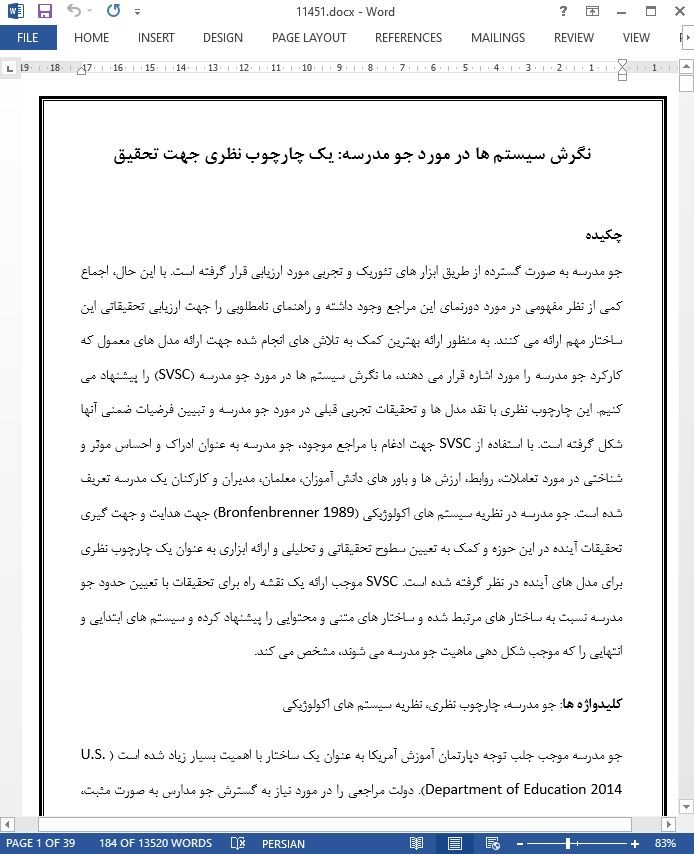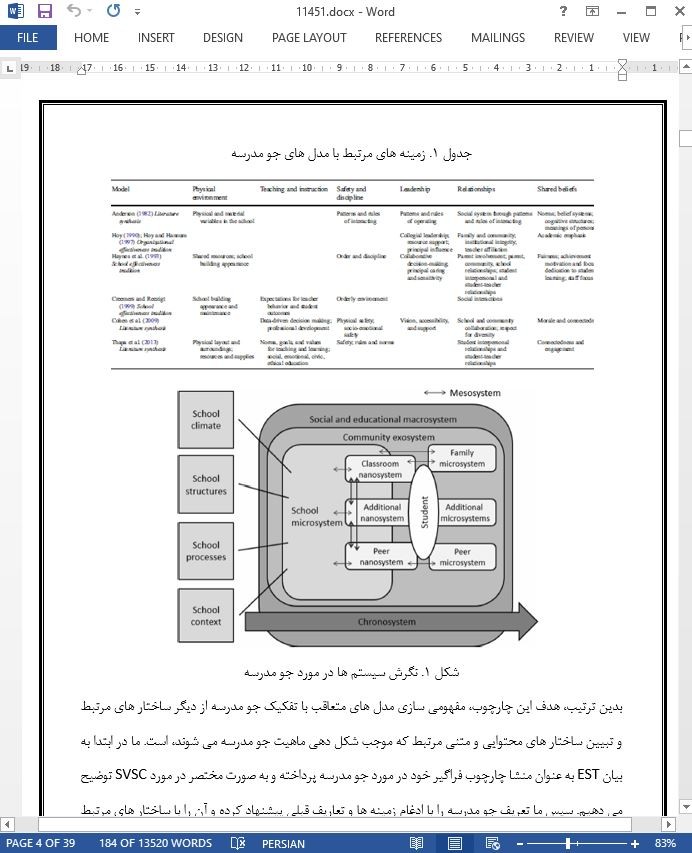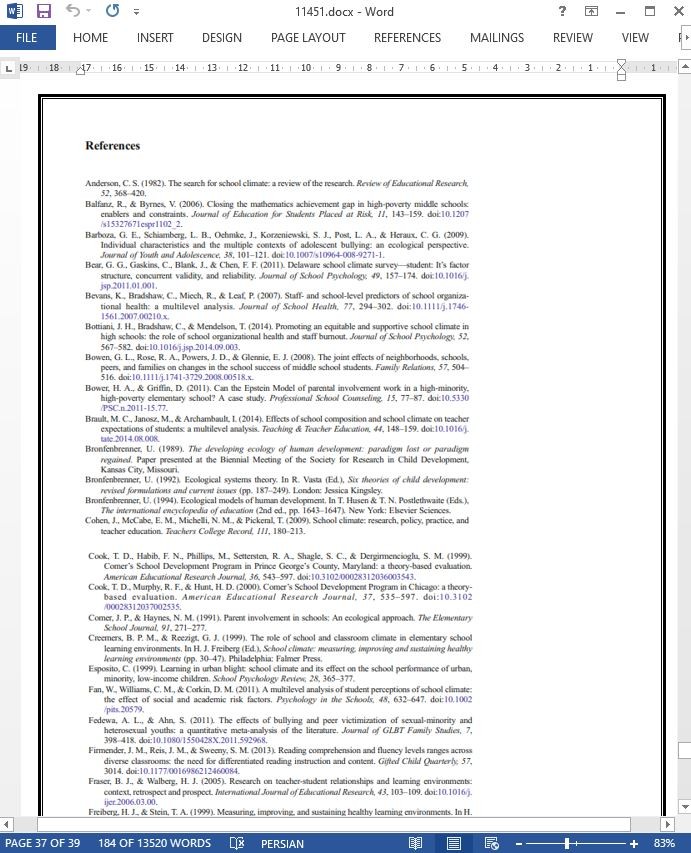
نگرش سیستم ها در مورد جو مدرسه
چکیده
جو مدرسه به صورت گسترده از طریق ابزار های تئوریک و تجربی مورد ارزیابی قرار گرفته است. با این حال، اجماع کمی از نظر مفهومی در مورد دورنمای این مراجع وجود داشته و راهنمای نامطلوبی را جهت ارزیابی تحقیقاتی این ساختار مهم ارائه می کنند. به منظور ارائه بهترین کمک به تلاش های انجام شده جهت ارائه مدل های معمول که کارکرد جو مدرسه را مورد اشاره قرار می دهند، ما نگرش سیستم ها در مورد جو مدرسه (SVSC) را پیشنهاد می کنیم. این چارچوب نظری با نقد مدل ها و تحقیقات تجربی قبلی در مورد جو مدرسه و تبیین فرضیات ضمنی آنها شکل گرفته است. با استفاده از SVSC جهت ادغام با مراجع موجود، جو مدرسه به عنوان ادراک و احساس موثر و شناختی در مورد تعاملات، روابط، ارزش ها و باور های دانش آموزان، معلمان، مدیران و کارکنان یک مدرسه تعریف شده است. جو مدرسه در نظریه سیستم های اکولوژیکی (Bronfenbrenner 1989) جهت هدایت و جهت گیری تحقیقات آینده در این حوزه و کمک به تعیین سطوح تحقیقاتی و تحلیلی و ارائه ابزاری به عنوان یک چارچوب نظری برای مدل های آینده در نظر گرفته شده است. SVSC موجب ارائه یک نقشه راه برای تحقیقات با تعیین حدود جو مدرسه نسبت به ساختار های مرتبط شده و ساختار های متنی و محتوایی را پیشنهاد کرده و سیستم های ابتدایی و انتهایی را که موجب شکل دهی ماهیت جو مدرسه می شوند، مشخص می کند.
جو مدرسه موجب جلب توجه دپارتمان آموزش آمریکا به عنوان یک ساختار با اهمیت بسیار زیاد شده است (U.S. Department of Education 2014). دولت مراجعی را در مورد نیاز به گسترش جو مدارس به صورت مثبت، احترام آمیز و امن ارائه کرده است. این توصیه ها با توجه به تحقیقات گسترده انجام شده در مورد جو مدرسه مورد اشاره قرار گرفته اند (Mitchell et al. 2009; Gottfredson et al. 2005). جو مدرسه از طریق ساختار های نظری، تعاریف عملیاتی و دسته بندی ها توصیف شده و به عنوان یک عامل برآورد کننده یا متغیر خروجی در بسیاری از تحقیقات تجربی مورد استفاده قرار گرفته است. با این حال، ارزیابی دقیق تر این مراجع موجب بروز برخی از تناقضات مفهومی و نظری می شود. از این رو نیاز به ارائه یک چارچوب جامع و دقیق جهت مطالعه جو مدرسه به منظور جهت دهی به تحقیقات تجربی آینده احساس می شود. بر اساس ارزیابی های انجام شده، تنازعات مفهومی به طور واضح مشاهده می شوند به طوری که دسته بندی های موجود در یک تحقیق با یکدیگر تناقض دارند. به طور مثال، جو مدرسه به عنوان یک ساختار پیچیده محسوب شده (Anderson 1982) و اغلب به صورت یک عامل تک بعدی مورد سنجش قرار می گیرد (e.g., Fedewa and Ahn 2011).
نتیجه گیری
SVSC با واسازی مدل ها و تحقیقات قبلی به زمینه ها و بیان فرضیات ضمنی آنها ارائه شده است. تعریف مفهومی مطلوب از جو مدرسه ارائه شده است: جو مدرسه متشکل از ادراکات شناختی و موثر در خصوص تعاملات اجتماعی، روابط، ارزش ها و باور های دانش آموزان، معلمان، مدیران و کارکنان در یک مدرسه است. جو مدرسه اغلب با ساختارهای متفاوت و مرتبط مانند موقعیت مدرسه، فرآیند ها و ساختار در هم آمیخته شده است؛ هر چند که این ساختار ها به عنوان بخشی از میکروسیستم محسوب می شوند و ممکن است مرتبط با جو مدرسه باشند، آنها از حیث مفهومی با جو مدرسه متفاوت هستند. شفافیت مفهومی در جو مدرسه جهت اعتبار ساختاری و توسعه مدل های معمول حائز اهمیت است. SVSC موجب ایجاد این شفافیت از طریق تشریح ساختار و تمایز آنها با ساختار های مرتبط می شود. علاوه براین، SVSC موجب ایجاد یک چارچوب سیستم محور جهت توسعه مدل های معمول و ارزیابی جو مدرسه می شود به طوری که این موضوع مرتبط با ساختار های دیگر حائز اهمیت مانند امنیت مدرسه و دستاورد های دانش آموزان است.
Abstract
School climate has been widely examined through both empirical and theoretical means. However, there is little conceptual consensus underlying the landscape of this literature, offering inconsistent guidance for research examining this important construct. In order to best assist the efforts of developing causal models that describe how school climate functions, we propose the Systems View of School Climate (SVSC). This theoretical framework was formed by deconstructing prior models and empirical research on school climate into themes and highlighting their implicit assumptions. Using the SVSC to synthesize this existing literature, school climate is defined as the affective and cognitive perceptions regarding social interactions, relationships, values, and beliefs held by students, teachers, administrators, and staff within a school. School climate is situated within Ecological Systems Theory (Bronfenbrenner 1989) to guide future research in this domain and help specify levels of research or analysis, thereby providing utility as a theoretical framework for future causal models. The SVSC provides a roadmap for research by demarcating school climate from related constructs, suggesting related contextual and structural constructs, and delineating proximal and distal systems which may shape the nature of school climate.
School climate has caught the attention of the US Department of Education as a construct of critical importance (U.S. Department of Education 2014). The government has put forth guidelines on the need to foster school climates that are positive, respectful, and safe. These recommendations are drawn from a substantial research base on school climate (e.g., Mitchell et al. 2009; Gottfredson et al. 2005). School climate is described through theoretical constructs, operational definitions, and taxonomies, and used as a predictor or outcome variable in a vast number of empirical studies. However, a closer examination of this literature reveals some conceptual and theoretical confusion. Notably, there is still a need for a clear, comprehensive, and overarching framework for the study of school climate in order to guide future empirical research. Upon examination, conceptual conflicts are apparent, such that definitions and taxonomies within the same study appear at odds. For example, school climate is described as a complex construct (Anderson 1982) yet is often measured as a unidimensional factor (e.g., Fedewa and Ahn 2011).
Conclusion
The SVSC was developed by deconstructing prior models and empirical research into themes and highlighting their implicit assumptions. A coherent conceptual definition of school climate is provided: School climate is composed of the affective and cognitive perceptions regarding social interactions, relationships, values, and beliefs held by students, teachers, administrators, and staff within a school. School climate is often conflated with related, yet substantively different constructs, such as school context, processes, and structure; although these constructs are part of the microsystem and may relate to school climate, they are conceptually and substantively different from school climate. Conceptual clarity in school climate is critical for construct validity and development of causal models. The SVSC provides this clarity through precise construct explication and differentiation from related constructs. Furthermore, the SVSC provides a systems-based framework to guide development of causal models and empirically test school climate as it relates to other constructs of central importance such as school safety and student achievement.
چکیده
نظریه سیستم های اکولوژیک
واسازی جو مدرسه
دورنمای مفهومی آشفته
رویکرد های رایج، ریشه ها و فرضیه ها
چارچوبی جهت تحقیق در مورد جو مدرسه
تعریف جو مدرسه
مولفه های جو مدرسه
چارچوب نظری جو مدرسه
ساختار های ابتدایی
کارکرد نظری SVSC
کارکرد های SVSC
نتیجه گیری
Abstract
Ecological Systems Theory
Deconstructing School Climate
A Chaotic Conceptual Landscape
Traditions, Themes, and Assumptions
A Framework for School Climate Research
Defining School Climate
School Climate Theoretical Framework
Theoretical Utility of the SVSC
Implications of the SVSC
Conclusion
- اصل مقاله انگلیسی با فرمت ورد (word) با قابلیت ویرایش
- ترجمه فارسی مقاله با فرمت ورد (word) با قابلیت ویرایش، بدون آرم سایت ای ترجمه
- ترجمه فارسی مقاله با فرمت pdf، بدون آرم سایت ای ترجمه



